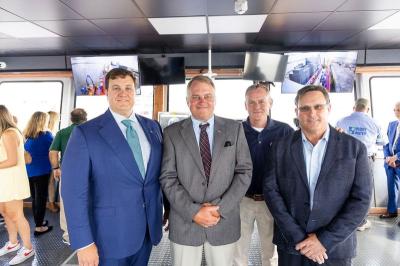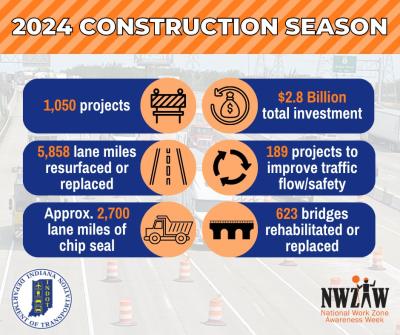At its peak, Gary Otter Construction employed better than a dozen people and was grinding massive volumes of mulch throughout a three-county area in and around Charleston, S.C. Realizing that unbridled growth is not always a good thing, owner Gary Otter decided to slow down to catch a breath of fresh air, and then later re-emerged as a leaner company with a different set of goals. Today, the company operates with a staff that is one-third its original size, has downsized its equipment to better meet its needs and has just completed work in support of the PGA Championship tour stop in Kiawah Island, S.C.
Dealing with the economic downturn in the midst of that changeover demanded a lot of creativity on the part of Otter and his colleagues, but its new focus is allowing them to tackle all that they can — and want — to handle.
Break Time
Formed when Gary Otter came to Charleston from his native Long Island, N.Y., to build a home for his parents, the company he founded, Gary Otter Construction, quickly became a player in everything from general contracting to land clearing, to logging and more.
“We eventually started focusing on logging, land clearing and large-scale mulch production, and that served us well for quite a while,” said Otter. “However, about eight or nine years ago, getting rid of all that material became a real issue. Not only was the competition fierce from other clearing companies in the region, the customers we had for the mulch started demanding wood chips rather than mulch from land-clearing projects. We decided that the additional headaches, coupled with what had become a steady six- or seven-day work week, was just too much, and we really cut back on our work.”
He said he had every intention of enjoying his partial retirement when a major area developer and resort owner with whom they’d worked in the past approached him about supplying mulch for their operation.
“This is a huge development company that owns several properties in the Charleston area, one of which is Kiawah Island Resort. They needed someone to provide them with a steady supply of mulch for their golf courses and properties. I felt this was something that I — along with my brothers who worked with me before — could reasonably handle, so we started back up again.”
Downsizing the Effort
Recognizing that the scale of this effort was going to be far different from the one they previously operated, Otter contacted Tidewater Equipment, his local Morbark dealer, about purchasing a grinder. In the past, they’d relied upon a Morbark 7600 Wood Hog, which, while extremely productive, was overkill for the volume of work they now anticipated doing.
“We also knew that there had been a lot of advancements made in grinding technology since we bought that first Wood Hog,” he said. “So we looked into a smaller machine that could still give us some really nice production and chose an 800-hp Morbark 3800 Wood Hog. That machine, teamed up with a Tigercat 726 feller buncher and other support equipment, has been the backbone of our land clearing and mulching operation.”
The bulk of Otter’s work revolves around providing mulch to the operator of the resort — anywhere from 50 to 70 100-yard loads four times each year for use on golf courses, around the various resort properties, etc. Upon arrival at his central location, all the material is first looked at, and any palmetto trees — which produce a product that is too stringy for their needs — are separated out. The remaining wood waste is then ground and reground through the 3800 Wood Hog and either stockpiled for subsequent use or delivered for immediate application.
To avoid having to upsize in order to meet occasional volume challenges, Otter has teamed up with another mulch producer in the area who provides additional feedstock to meet the demand.
“I work with Brett Henry of W. B. Henry Contracting in Charleston,” he said. “Brett has a chipper and two grinders — also all Morbark machines — so whatever material he doesn’t use, we’ll haul to our site, stockpile, and then regrind to make the mulch product we need for the resort. It’s allowed us to meet the demand without risking getting too big again.”
High-Profile Project
If staying under the radar was Otter’s intention with the new business, fate had other plans for him when the Kiawah Island Resort won the bid to host the 2012 PGA Championship, one of the biggest stops on the PGA Tour. Preparation for the event began more than a year in advance of the actual Aug. 9, 2012, start date and involved some major land clearing to create parking lots, common areas for attendee pickups and so on.
“This was a huge event and a huge undertaking,” said Otter. “We had 100-acre areas just overgrown with 25-foot-tall trees and myrtle bushes that we cleared, mowed and laid down mulch in preparation for the opening. The 3800 Wood Hog was outstanding for us, not just because it was so productive, but also because it was easy to move around from site to site. It’s been a great unit for us, the maintenance demands on it are low and easy, and it’s also great on fuel. Compared with our previous 1,000-hp grinder, we’ve cut fuel consumption down by about one-third, which, at today’s diesel prices and our current usage, saves us about $20,000 a year. That, too, is huge.”
Otter wasn’t overstating the size of the event. All told, more than 27,000 people — including competitors, support staff, volunteers, media and fans — were at the course each day. In light of the demands generated by the event, Otter said that Tidewater Equipment has been outstanding in support of both the Morbark and Tigercat units for them, responding quickly to any needs and making replacement parts fast and simple.
“We’re not a huge operation, but we still have needs that can sometimes be urgent, and they’ve always been responsive to those needs.”
Coping With Change
Despite a solid South Carolina economy, which fared better than most during the economic downturn of 2008, Otter and his crew — brothers Christopher and Jimmy as well as operator/mechanic Chris Sires have had to get creative during some of the leaner times.
“To make ends meet, we did just about everything,” he said. “We built bridges on golf courses and built a half-mile of sound barrier for a local contractor. We also did a fair amount of demolition work, including a hotel — which had three-story concrete buildings as well as wood-framed structures — and we recycled better than 80 percent of everything on site. In fact, all the concrete was crushed, screened and used to make an access road to parking areas for the PGA event. The bottom line is, despite these challenges, we knew what kind of business we wanted this time around and — thanks to some good planning, a great customer base and equipment that’s met our needs perfectly — we’re doing it.”
Today's top stories














